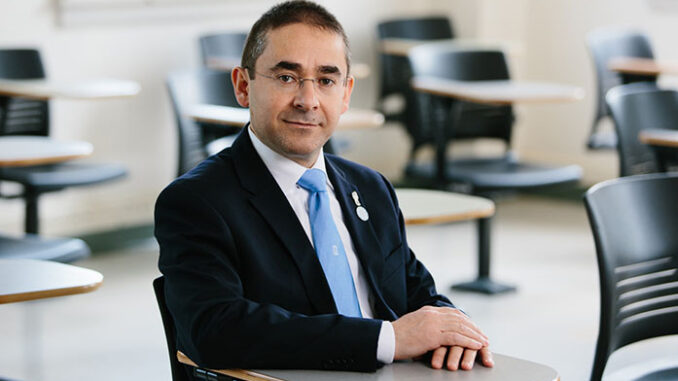
Two news stories on March 27 exposed what is wrong at the University of Arizona (UA), and, by extension, the Tucson metropolis.
The first was a story in the Arizona Daily Star about a presentation by Fouad Abd-El-Khalick to 75 staffers of UA and to 300 others who watched via Zoom. Who’s he? He is a candidate being considered for the position of provost at the university.
The second was a story in the Wall Street Journal about a South Korean company announcing plans to build a $4 billion advanced microchip plant in the small town of West Lafayette, Indiana, which is the home of Purdue University. The chips are targeted for the burgeoning industry of artificial intelligence. Like UA, Purdue is a land grant university.
Abd-El-Khalick’s presentation was replete with de rigueur and pro forma platitudes, sophistries, and banalities about his commitment to diversity, the disadvantaged, and the larger Tucson community. He knew his audience.
No doubt, he didn’t get one question on why a $4 billion chip plant is going to be built in West Lafayette and not Tucson.
The reason is that Purdue has world-class and world-renown engineering programs in microelectronics and semiconductors. Purdue has also benefited tremendously from the outstanding leadership of recently retired university president Mitch Daniels, the former governor of Indiana.
For sure, Abd-El-Khalick wasn’t asked the following question: What would help minorities, the disadvantaged, and the larger Tucson community more: a) hollow, unoriginal rhetoric about diversity; or b) a $4 billion chip plant?
Abd-El-Khalick seemed to suggest that he is the embodiment of diversity, although his skin shade is not any darker than mine. And with a PhD in science education, he certainly isn’t disadvantaged.
Given that I had a long career at the vanguard of equal rights and equal opportunity, I have additional questions for Abd-El-Khalick:
Dear Mr. Abd-Ell-Khalick:
The following questions are not intended to be glib or provocative. They’re being asked because it’s important for a candidate espousing diversity to be clear about the meaning of the word and to be explicit about the admissions criteria he would establish at the university.
You’re from Lebanon. Does that make you a White person or a racial minority for purposes of diversity, equity and inclusion?
If that makes you a racial minority, why so?
Israel is to the south of Lebanon. Are Jews minorities for purposes of DEI? Why or why not?
How about Armenians?
At one time, Lebanon was an example of a successful multicultural, multiethnic, and multiracial society. It no longer is. Why did diversity stop working well there?
Mexican Americans account for approximately 40 percent of the population of the City of Tucson. Italian Americans account for approximately five percent. Are both groups considered minorities?
If Mexicans are considered to be both minorities and disadvantaged for DEI purposes but Italians are not, why are they seen differently?
Is it because Italians as a group have more income and wealth than Mexicans as a group? How would you know that? Wouldn’t it be fairer (and legal) to consider an individual’s income and wealth instead of the income and wealth of the person’s assigned group identity?
By the way, are you aware that of the 38 million Americans in poverty, 16.7 million of them are non-Hispanic Whites?
You seem to be saying that the University of Arizona should give special consideration to certain identity groups. That implies that the university has been discriminating against qualified applicants from these groups and needs to take remedial actions. Has the university engaged in discrimination?
Thank you for your answers.
Respectfully Yours,
Craig J. Cantoni
Tucson
These questions show why I’m not qualified to be a university provost or professor.
Mr. Cantoni can be reached at ccan2@aol.com or craigcantoni@gmail.com.
